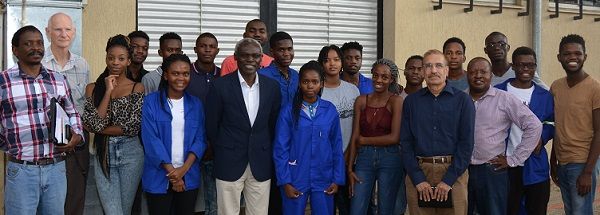
Science and technology university receives first intake of Marine Engineering students

Earlier this month, the first seventeen students in the new marine engineering degree at the Namibia University of Science and Technology, were welcomed at a special function by the engineering faculty’s Dean, Dr Samuel John.
Laying the foundation for an extensive, modern education in maritime science started in 2013 when the Namibia University of Science and Technology (NUST) partnered with the Namibian Maritime Fisheries Institute and Satakunta University of Applied Sciences in Finland. The three institutions collaborated in an educational project called Maribia.
The science university said this week the project is in line with NDP5, recognising the importance of the blue economy but adding that its development requires a broad base of skill and expertise development.
The academic side of the programme was developed in partnership with Satakunta University through its MARIBILIS project to improve maritime education in Namibia through quality education and training to build and shape the required human resources capacity in the sector.
“This will enable graduates to develop innovative solutions and approaches that enhance productivity and efficiency in the maritime sector,” NUST stated this week.
Addressing his new student, Dean John said ” I believe NUST is the best institution to run this programme. Our curriculum is aligned with global standards. This programme is not just important to us as an institution, it is equally important for the whole country as stipulated in the national development plans that the blue economy is one of the biggest aspects in Namibia’s socio-economic development. It is a sleeping giant that needs to be explored exceedingly.”
“We are very excited to be part of this partnership. As partners, we frequently exchange ideas and views, at the same time appreciating others’ strengths and whenever we have differences, we try to manage them,” he said adding that this partnership will equip graduates with the right skill to compete in the global labour market.
The maritime engineering degree is a full-time course spanning four and a half years including overseas study in Finland and work-integrated learning. Students are equipped with comprehensive and systematic knowledge and skills to operate in international shipping traffic to safely manage, facilitate and undertake operation and maintenance linked to shipboard Marine Engineering systems.
Upon completion, graduates obtain a degree certified by both NUST and Satakunta University.
Caption: The first student intake in Marine Engineering and their lecturers were welcome by the Dean of the Faculty of Engineering at the Namibian University of Science and Technology, Dr Samuel John (front middle left).









































